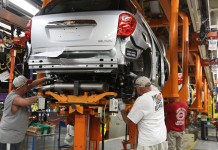US automaker General Motors said Tuesday it would more than triple its contribution to a rescue of ailing European division Opel/Vauxhall, providing more than half the total after calls from European governments.
Opel said in a statement that GM would invest 1.9 billion euros (2.6 billion dollars) “as part of its commitment to the European viability plan,” more than three times an initial offer of 600 million euros.
Opel/Vauxhall chief executive Nick Reilly called the decision “the right course of action” for the company and said it “should clearly signal our determination to fix our business.”
The funds would be provided in the form of both equity and loans, Reilly added.
GM had initially estimated Opel/Vauxhall would need 3.3 billion euros to get back on track before European governments called for an additional 415 million “to offset the potential impact of adverse market developments,” the statement said.
With GM putting up 1.9 billion euros of the new total, 3.7 billion euros, governments would be asked for less than two billion euros in loan guarantees, compared with 2.7 billion initially, it added.
Reilly said at the Geneva Motor Show in Switzerland that the move was aimed at encouraging European — especially German — state backing for Opel by demonstrating the “very high” priority the US parent group places on Opel.
“We have to recognise that most of the money is from the US government and taxpayers. So this is not easy,” he told journalists after GM’s cash injection.
“We would expect Germany to be a significant contributor, if they are going to contribute,” he said.
Reilly said talks with German authorities were likely to intensify in the next couple of weeks. British, Spanish and Polish funding levels were still not known.
“We’re optimistic but we can’t say 100 percent,” he added.
GM had decided at first to sell Opel/Vauxhall but changed its mind after its own rescue by the US government and said it would to turn the European division around itself, sparking scepticism among European governments and trade unions.
The car maker is present in several countries and has a workforce of 50,000 that it plans to cut by 8,300, mainly in Germany and Belgium.
GM’s increased support removes however “any potential liquidity risks during the restructuring this year,” the statement said.
Opel said it hoped the GM commitment, given despite “high-priority demands on its liquidity,” would be seen “as a major milestone in our ongoing discussions about government guarantees.”
The statement quoted GM chairman and chief executive Ed Whitacre as saying the group wanted to show support for Opel/Vauxhall and perhaps smooth tense relations with European labour and political leaders.
“We see this as a major step towards instilling renewed trust and confidence into Opel/Vauxhall’s customers, employees, business partners, unions, dealers and European governments,” he said.
On February 24, the German government and parliament said Opel’s rescue plan was insufficient and called for for “firewalls” to prevent German aid from being transferred to Opel’s parent company in the United States.
Experts say there is 20 percent excess auto production capacity in Europe, but Reilly said on February 9 that an independent study demanded by Germany found that Opel’s plan “is financially sound and offers a realistic roadmap to renewed business success.”
Opel should “break even in 2011 and make a decent profit in 2012,” he added.
He acknowledged in Geneva nonetheless that the market in Europe was weak and was expected to say that way in 2010.







